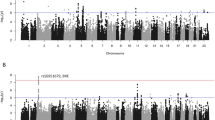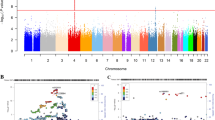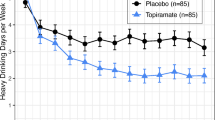Abstract
In alcoholism, both relapse to alcohol drinking and treatment response are suggested to be genetically modulated. This study set out to determine whether the top 15 single nucleotide polymorphisms (SNPs) of a recent genome-wide association (GWA) and follow-up study of alcohol dependence are associated with relapse behavior and pharmacological treatment response in 374 alcohol-dependent subjects who underwent a randomized, double-blind, placebo-controlled trial with acamprosate, naltrexone or placebo. The single nucleotide polymorphism, rs13273672, an intronic SNP in the gene for GATA-binding protein 4 (GATA4), was associated with relapse within the 90-day medical treatment period (P<0.01). Subsequent pharmacogenetic analyses showed that this association was mainly based on patients treated with acamprosate (P<0.01). In line with the observation that natriuretic peptide promoters are modulated by GATA4, a significant gene dose effect on the variance of atrial natriuretic peptide (ANP) plasma concentration in the different GATA4 genotypes (P<0.01) was found. Hence, genetic variations in GATA4 might influence relapse and treatment response to acamprosate in alcohol-dependent patients via modulation of ANP plasma levels. These results could help to identify those alcohol-dependent patients who may be at an increased risk of relapse and who may better respond to treatment with acamprosate.
This is a preview of subscription content, access via your institution
Access options
Subscribe to this journal
Receive 6 print issues and online access
$259.00 per year
only $43.17 per issue
Buy this article
- Purchase on Springer Link
- Instant access to full article PDF
Prices may be subject to local taxes which are calculated during checkout


Similar content being viewed by others
References
Treutlein J, Cichon S, Ridinger M, Wodarz N, Soyka N, Zill P et al. Genome-wide association study of alcohol dependence. Arch Gen Psychiatry 2009; 66: 773–784.
Prescott CA, Sullivan PF, Kuo PH, Webb BT, Vittum J, Patterson DG et al. Genome-wide linkage study in the Irish affected sib pair study of alcohol dependence: evidence for a susceptibility region for symptoms of alcohol dependence on chromosome 4. Mol Psychiatry 2006; 11: 603–611.
Johnson C, Drgon T, Liu QR, Walther D, Edenberg H, Rice H et al. Pooled association genome scanning for alcohol dependence using 104,268 SNPs: validation and use to identify alcoholism vulnerability loci in unrelated individuals from the collaborative study on the genetics of alcoholism. Am J Med Genet B Neuropsychiatr Genet 2006; 141B: 844–853.
Liu QR, Drgon T, Johnson C, Walther D, Hess J, Uhl GR . Addiction molecular genetics: 639 401 SNP whole genome association identifies many ‘cell adhesion’ genes. Am J Med Genet B Neuropsychiatr Genet 2006; 141B: 918–925.
McBride K, Nemer M . Regulation of the ANF and BNP promoters by GATA factors: lessons learned for cardiac transcription. Can J Physiol Pharmacol 2001; 79: 673–681.
Kovács GL . Natriuretic peptides in alcohol withdrawal: central and peripheral mechanisms. Curr Med Chem 2003; 10: 2559–2576.
Kiefer F, Wiedemann K . Neuroendocrine pathways of addictive behaviour. Addict Biol 2004; 9: 205–212.
Breitling LP, Dahmen N, Illig T, Rujescu D, Nitz B, Raum E et al. Variants in COMT and spontaneous smoking cessation: retrospective cohort analysis of 925 cessation events. Pharmacogenet Genomics 2009; 19: 657–659.
Spanagel R . Alcoholism—a systems approach from molecular physiology to behavior. Physiol Rev 2009; 89: 649–705.
Mann K, Kiefer F, Smolka M, Gann H, Wellek S, Heinz A . Searching for responders to acamprosate and naltrexone in alcoholism treatment: rationale and design of the PREDICT study. Alcohol Clin Exp Res 2009; 33: 674–683.
Anton RF, O'Malley SS, Ciraulo DA, Cisler RA, Couper D, Donovan DM et al. COMBINE Study Research Group. Combined pharmacotherapies and behavioral interventions for alcohol dependence: the COMBINE study: a randomized controlled trial. JAMA 2006; 295: 2003–2017.
Wigginton JE, Cutler DJ, Abecasis GR . A note on exact tests of Hardy–Weinberg equilibrium. Am J Hum Genet 2005; 76: 887–893.
Barret JC, Fry B, Maller J, Daly MJ . Haploview: analysis and visualization of LD and haplotype maps. Bioinformatics 2005; 21: 263–265.
Veyrieras JB, Kudaravalli S, Kim SY, Dermitzakis ET, Gilad Y, Stephens M et al. High-resolution mapping of expression-QTLs yields insight into human gene regulation. PLoS Genet 2008; 4: e1000214.
Gilad Y, Rifkin SA, Pritchard JK . Revealing the architecture of gene regulation: the promise of eQTL studies. Trends Genet 2008; 24: 408–415.
Blanchette M, Kent WJ, Riemer C, Elnitski L, Smit AFA, Roskin KM et al. Aligning multiple genomic sequences with the Threaded Blockset Aligner. Genome Res 2004; 14: 708–715.
Schluterman MK, Krysiak AE, Kathiriya IS, Abate N, Chandalia M, Srivastava D et al. Screening and biochemical analysis of GATA4 sequence variations identified in patients with congenital heart disease. Am J Med Genet A 2007; 143A: 817–823.
Skinner HA, Horner JL . Alcohol Dependence Scale: User's Guide. Addiction Research Foundation: Toronto, Canada, 1984.
Bohn MJ, Krahn DD, Staehler BA . Development and initial validation of a measure of drinking urge in abstinent alcoholics. Alcohol Clin Exp Res 1995; 19: 600–606.
Heatherton TF, Kozlowski LT, Frecker RC, Fagerström KO . The Fagerström test for nicotine dependence: a revision of the Fagerström tolerance questionnaire. Brit J Addict 1991; 86: 1119–1127.
Laux L, Glanzmann P, Schaffner P, Spielberger CD . Das State-Trait-Angstinventar. Beltz: Weinheim, Germany, 1981.
Durocher D, Nemer M . Combinatorial interactions regulating cardiac transcription. Dev Genet 1998; 22: 250–262.
Tremblay JJ, Viger RS . GATA factors differentially activate multiple gonadal promoters through conserved GATA regulatory elements. Endocrinology 2001; 142: 977–986.
Xin M, Davis CA, Molkentin JD, Lien CL, Duncan SA, Richardson JA et al. A threshold of GATA4 and GATA6 expression is required for cardiovascular development. Proc Natl Acad Sci USA 2006; 103: 11189–11194.
de Bold AJ . Atrial natriuretic factor: a hormone produced by the heart. Science 1985; 230: 767–770.
Quirion R, Dalpe M, Dam TV . Characterization and distribution of receptors for the atrial natriuretic peptides in mammalian brain. Proc Natl Acad Sci USA 1986; 83: 174–178.
Antoni FA, Hunter EF, Lowry PJ, Noble JM, Seckl JR . Atriopeptin: an endogenous corticotropin-release inhibiting hormone. Endocrinology 1992; 130: 1753–1755.
Kellner M, Wiedemann K, Holsboer F . Atrial natriuretic factor inhibits the CRH-stimulated secretion of ACTH and cortisol in man. Life Sci 1992; 50: 1835–1842.
Wiedemann K, Jahn H, Kellner M . Effects of natriuretic peptides upon hypothalamo–pituitary–adrenocortical system activity and anxiety behaviour. Exp Clin Endocrinol Diabetes 2000; 108: 5–13.
Bhattacharya SK, Chakrabarti A, Sandler M, Glover V . Anxiolytic activity of intraventricularly administered atrial natriuretic peptide in the rat. Neuropsychopharmacology 1996; 15: 199–206.
Wiedemann K, Jahn H, Yassouridis A, Kellner M . Anxiolyticlike effects of atrial natriuretic peptide on cholecystokinin tetrapeptide-induced panic attacks: preliminary findings. Arch Gen Psychiatry 2001; 58: 371–377.
Strohle A, Holsboer F . Stress responsive neurohormones in depression and anxiety. Pharmacopsychiatry 2003; 36: 207–214.
Medvedev A, Igosheva N, Crumeyrolle-Arias M, Glover V . Isatin: role in stress and anxiety. Stress 2005; 8: 175–183.
Kiefer F, Andersohn F, Jahn H, Wolf K, Raedler TJ, Wiedemann K . Involvement of plasma atrial natriuretic peptide in protracted alcohol withdrawal. Acta Psychiatr Scand 2002; 105: 65–70.
Hillemacher T, Frieling H, Luber K, Yazici A, Muschler MA, Lenz B et al. Epigenetic regulation and gene expression of vasopressin and atrial natriuretic peptide in alcohol withdrawal. Psychoneuroendocrinology 2009; 34: 555–560.
Sass H, Soyka M, Mann K, Zieglgansberger W . Relapse prevention by acamprosate. Results from a placebo-controlled study on alcohol dependence. Arch Gen Psychiatry 1996; 53: 673–680.
Mann K, Kiefer F, Spanagel R, Littleton J . Acamprosate: recent findings and future research directions. Alcohol Clin Exp Res 2008; 32: 1105–1110.
Spanagel R, Kiefer F . Drugs for relapse prevention of alcoholism—10 years of progress. Trends Pharmacol Sci 2008; 29: 109–115.
Zalewska-Kaszubska J, Cwiek W, Dyr W, Czarnecka E . Changes in the beta-endorphin plasma level after repeated treatment with acamprosate in rats selectively bred for high and low alcohol preference. Neurosci Lett 2005; 388: 45–48.
Kiefer F, Jahn H, Otte C, Nakovics H, Wiedemann K . Effects of treatment with acamprosate on beta-endorphin plasma concentration in humans with high alcohol preference. Neurosci Lett 2006; 404: 103–106.
Guillaume P, Gutkowska J, Gianoulakis C . Increased plasma atrial natriuretic peptide after acute injection of alcohol in rats. J Pharmacol Exp Ther 1994; 271: 1656–1665.
Acknowledgements
After the manuscript had been accepted, an independent GWAS on alcohol dependence confirmed the association finding of the GATA4 rs13273672 risk allele (Edenberg HJ, Koller DL, Xuei X, Wetherill L, McClintick JN, Almasy L et al. Genome-wide Association Study of Alcohol Dependence Implicates a Region on Chromosome 11. Alc Clin Exp Res 2010; 34: 840–852).
We thank Iris Reinhard from the Department of Biostatistics of the Central Institute of Mental Health for her statistical support. The study was supported by the National Genome Research Network (NGFN) and the German Federal Ministry of Education and Research (BMBF; FKZ 01GS0117/NGFN, 01GS8152/NGFN-plus, FKZ EB 01011300 and 01EB0410), and by the federal state of Baden-Württemberg (DNA-bank addiction). All authors declare that they have no conflict of interest, including financial interests and relationships and affiliations relevant to the subject of the manuscript. FK, MR and SHW had full access to all the data in the study and take full responsibility for the integrity of the data and the accuracy of data analysis.
Author information
Authors and Affiliations
Corresponding author
Ethics declarations
Competing interests
The authors declare no conflict of interest.
Additional information
Supplementary Information accompanies the paper on the The Pharmacogenomics Journal website
Supplementary information
PowerPoint slides
Rights and permissions
About this article
Cite this article
Kiefer, F., Witt, S., Frank, J. et al. Involvement of the atrial natriuretic peptide transcription factor GATA4 in alcohol dependence, relapse risk and treatment response to acamprosate. Pharmacogenomics J 11, 368–374 (2011). https://doi.org/10.1038/tpj.2010.51
Received:
Revised:
Accepted:
Published:
Issue Date:
DOI: https://doi.org/10.1038/tpj.2010.51
Keywords
This article is cited by
-
FMRI-based prediction of naltrexone response in alcohol use disorder: a replication study
European Archives of Psychiatry and Clinical Neuroscience (2021)
-
Metabolomics biomarkers to predict acamprosate treatment response in alcohol-dependent subjects
Scientific Reports (2017)
-
Medikamentöse rückfallprophylaktische Behandlung der Alkoholabhängigkeit
Der Nervenarzt (2017)



